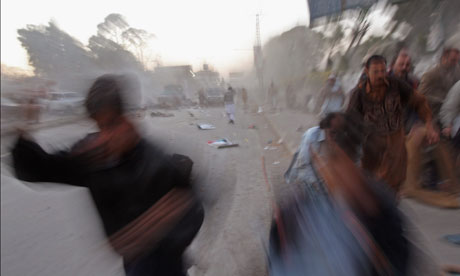Pakistan police officers to be arrested over death of Benazir Bhutto
The men controversially ordered the crime scene to be hosed down less than two hours after the killing

A Pakistani court has ordered the arrest of two senior police officers in connection with Benazir Bhutto's assassination, reviving hopes for a breakthrough in Pakistan's most pressing political mystery.
An anti-terrorism court ordered the arrest of Rawalpindi's former police chief, Saud Aziz, and his deputy Khurram Shahzad, who ordered the crime scene to be washed down less than two hours after the killing, destroying critical evidence."They were responsible for Bhutto's security," said special investigator Chaudhry Zulfiqar. "They ordered the crime scene to be hosed down despite resistance from other officials."
A strongly-worded UN report into Bhutto's death last April said the decision to wash the crime scene did "irreparable damage" to the subsequent investigation. Investigators speculated that Aziz had been influenced by powerful military intelligence agencies.
Aziz and Khurram, who are now retired from the police, could not be contacted today. They are due to be formally charged on 11 December along with five men already in custody.The warrants are the latest twist in a torturously slow police investigation. Three years after Bhutto was killed in a suicide blast as she left an election rally in Rawalpindi on 27 December 2007, Pakistanis have little idea of who was behind her death.
Pervez Musharraf, who was president at the time, initially blamed Taliban leader Baitullah Mehsud, but officials from Bhutto's party, the PPP, have said that other forces, possibly including elements of Pakistan's powerful military, played a role in her death.
Bhutto's widower, President Asif Zardari, has vowed to unveil her killers, but made little progress in an investigation bogged down by controversy, recrimination and conspiracy theories – one popular rumour in Pakistan has it that Zardari himself was responsible.
The three-man UN investigation into the killing, headed by Chilean diplomat Heraldo Muñoz, published its report last April in an effort to bring some clarity. It dismissed the allegations against Zardari and blamed Musharraf for failing to protect Bhutto, while accusing police and intelligence officials of hampering the investigation into her death.
The UN team said that Aziz stalled the investigation for two days after Bhutto's death, deliberately prevented a postmortem on her body, and gave the order to sanitise the crime scene just 100 minutes after Bhutto's death. As a result crucial DNA evidence was lost and investigators gathered just 23 pieces of evidence instead of the "thousands" that would be expected, Muñoz's team noted.
The UN focused on the actions of Aziz, who witnesses said was "constantly talking on his mobile phone" as doctors scrambled to save Bhutto's life in a Rawalpindi hospital.
The UN received "credible information" that the Pakistani intelligence agencies had intervened. But Aziz refused to say who he spoke with, and tried to blame the failure to carry out an autopsy on Zardari – something that was "highly improper", the UN said. "It suggests a preconceived effort to prevent a thorough examination of Ms Bhutto's remains."
The strongly-worded report represented a watershed in moribund efforts to solve the mystery of Bhutto's death – Pakistan's greatest political trauma since the dictator General Zia-ul-Haq died in mysterious circumstances in 1988. But it fell short of identifying those behind her death, and government efforts to advance the probe has since floundered.
Bhutto's own party has been split by divisions. Last week Zardari suspended the membership of Naheed Khan, Bhutto's confidante, following simmering tensions that included criticism of his failure to find Bhutto's killers. Critics have also raised questions about the role of Rehman Malik, Bhutto's security chief and now Pakistan's interior minister.
The main suspect in custody remains a teenager from the tribal belt accused of helping the Bhutto assassins. His case, and those of the police officers, will be heard in camera at Adiala jail outside Rawalpindi.
But the government has not probed the role of the other parties mentioned in the UN report – former president Pervez Musharraf, currently in exile in London, and the intelligence services that are considered beyond the control of the civilian authorities.
